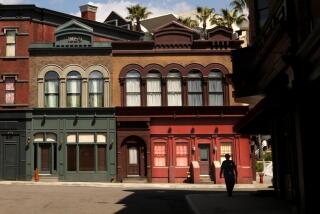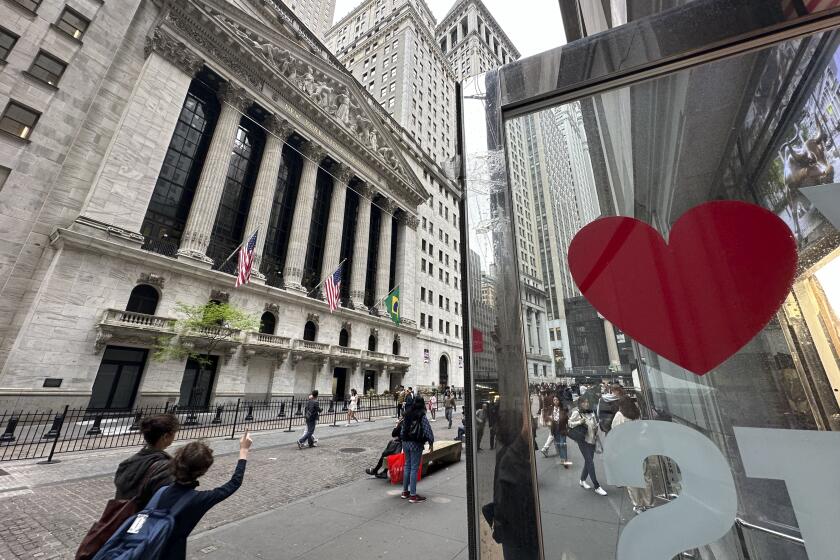Orange-Based Centennial Soars Along With Real Estate Prices
Eighteen months ago, houses built by Centennial Group Inc. in San Bernardino and Riverside counties sold for $78,000 to $90,000.
“Now our houses range between $106,000 and $130,000,” said John R. White, chairman of the Orange-based company. “The very same houses.”
The boom in residential real estate in Southern California is one reason Centennial posted a 600% increase in profits this year, its first as a public company. Centennial said Friday that it earned $11 million, up from $1.5 million last year.
Revenues were also up: For the fiscal year ending June 30, they were $105 million, a 250% increase from last year’s $30 million.
Fourth-quarter results: Profits of $2.8 million on revenues of $36 million, up from a loss of $400,000 on revenues of $5 million.
But Centennial’s stock price has languished much of the year at around $3 on the American Stock Exchange, far below the $12 a share Centennial hoped it would be by now.
One reason: Centennial Group Inc. started life as a public company with something most new companies don’t have: 28,000 shareholders.
All of them were limited partners in a group of six real estate partnerships that were bundled together to create Centennial.
A lot of the partners were probably more interested in the tax breaks of a limited real estate partnership than in the income or capital gains from stock ownership.
Nor have they been able to sell any of their stock at an attractive price. So the shareholders--who own an average of 700 shares apiece--hold on. Very little of the stock has been traded, depressing the price.
No more than 5% of the outstanding stock has traded in the last year, estimates Mark Matheson, a securities analyst at Newport Beach investment banker Cruttenden & Co.
The average for an American Stock Exchange company is about 35% a year, said Matheson.
“They’ve done a good job of educating their investors about the company,” said Matheson. “But it’s an unusual company. Most publicly traded real estate companies pick out a niche like building or selling homes or property management.”
Centennial, on the other hand, is into several things: It builds low-priced homes, develops and sells land and commercial buildings and manages property for others. Unlike other publicly traded home builders, Centennial shepherds its own land through the planning and zoning process.
The diversity insulates it a little from risk in the periodic boom-and-bust cycles of the real estate industry, said Matheson.
The inexpensive homes Centennial builds are also less vulnerable to downturns when interest rates soar as they did in the last recession, said company chairman White.
“We see these houses as less volatile in a negative market,” he said in a recent interview in his spacious office overlooked by a 3-foot replica of the statue of John Wayne as a cowboy at John Wayne Airport.
“The housing market for entry-level buyers fares better even in difficult times than more expensive housing,” White said.
White, 42, and Vice Chairman John B. Joseph, 49, started with a single custom-built house in Huntington Beach in the late 1960s. They went on to put together the limited partnerships and also ran the companies that oversaw the partnerships’ investments.
By the middle of this decade, lenders were more conservative, and White and Joseph found that they couldn’t cajole them out of the money the partnerships needed to finance big deals.
The answer, the two decided: Go public, and the company could find more ways to tap the capital markets at less expense than borrowing from the banks. The company went public in June, 1987. White and Joseph own about a quarter of the 26 million outstanding shares.
While it is based in Orange County, little of Centennial’s business is here. It has picked booming markets in Riverside and San Bernardino counties, the Sacramento area and Phoenix--some of the fastest-growing markets in the nation.
But all are less expensive housing markets than Orange, Los Angeles, San Francisco and San Diego counties, which have among the highest prices for single-family houses in the nation.
On its commercial buildings, Centennial builds to sell, not to hold, since it is those big sales that push up profits and keep shareholders happy.
And Centennial, whose stock is selling at a price far below the value of its holdings, has a lot of projects that will soon be ready to sell, said analyst Matheson.
Even in the space of a year, the real estate industry tends to ride a roller coaster. In Centennial’s third quarter--the first three months of the year, when commercial property sales tend to slow in the Southwest--profits were a paltry $6,000.
“But they have a lot of property getting to a mature state of development, and that should help their earnings be more smooth,” said Matheson.
“There’s still some risk of a cutback in home building in the event of a recession, but with the markets they’re in, they should do better than most.”






